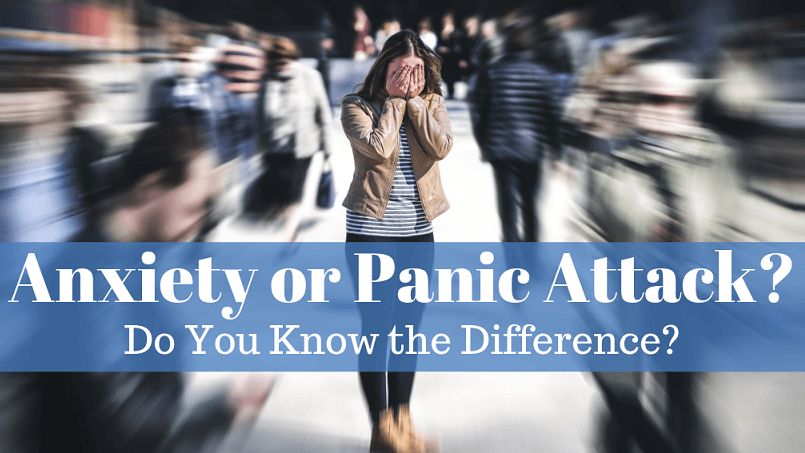
What’s the Difference Between a Panic Attack and an Anxiety Attack?
What is anxiety?
Anxiety is natural human behavior as it is a standard way of the brain’s reaction to stress and fear. We somehow felt anxious, maybe while going for an interview or while giving the test or exam. Feeling anxious is okay, but getting an anxiety attack frequently signifies that the person may have an anxiety disorder. People suffering from an anxiety disorder may repeatedly face intense, excessive, persistent worry about everyday life. When anxiety disorder reaches its peak, then that situation is referred to as a panic attack. Mental health professionals described different anxiety disorder types such as separation anxiety disorder, generalized anxiety disorder, specific phobias, social anxiety disorder, etc..
The following are the symptoms of Anxiety disorder:
- The person feels nervous, restless, or tense.
- Having an increased heart rate
- Sweating and Trembling
- Trouble in concentrating or thinking about anything other than the present worry
- Experiencing gastrointestinal (GI) problems
- Having difficulty controlling worry
- Having trouble sleeping
- Individual Feels weak or tired.
- Breathing rapidly (hyperventilation)
- Having a sense of danger, panic, or doom
What are panic attacks?
Panic attacks are the sudden uncontrollable reaction of an individual who has intense fear even when they are in no danger. The situation can be devastating because when it occurs, one loses all their control and feels like having a heart attack or even dying.
Symptoms of panic attacks may last up to a few minutes.
One can face the situation of a panic attack without any warning. A panic attack can hit you at any time. The following list of symptoms that an individual may face.
- A feeling of unreality or detachment
- Dizziness, lightheadedness, or faintness
- Chest pain
- Nausea
- Chills
- Trembling or shaking
- Rapid, pounding heart rate
- Sense of impending doom or danger
- Fear of loss of control or death
- Sweating
- Breathlessness or tightness in your throat
- Hot flashes
- Abdominal cramping
- Headache
- Numbness or tingling sensation
Anxiety attack versus panic attack
We all must have heard people mix up these two terms, but the fact is that they both are entirely different situations. Anxiety includes extreme stress and fear and is often related to stressful situations. At the same time, panic attacks are a sudden uncontrollable reaction of an individual.
- An anxiety attack and a panic attack look similar and have some common emotional and physical symptoms.
- One can have these attacks at the same time.
- As we know, anxiety is related to some stressful or unexpected situations, while panic attacks are mostly due to stress but not always.
- There are different ranges of anxiety attacks starting from mild to severe; on the other hand, panic attacks are still intense.
- Symptoms of panic attacks are always more potent than an anxiety attack.
As both of the above mentioned are two different kinds of mental disorders, there are many risk factors associated with these two.
The risk factors associated with panic attacks
- Family history of panic disorder
- Any traumatic event, such as physical abuse or a severe accident
- Smoking or excessive caffeine intake
- History of childhood physical or sexual abuse
- Significant changes in your life
- Significant life stress, such as the death or severe illness of a loved one
Risk factors associated with anxiety
- Personality
People who don’t talk too much or are introverts are more prone to this disorder.
- Trauma
Individuals who faced some abuse or witnessed any traumatic event have a higher risk of anxiety attacks.
- Stress due to illness
Having any long term health issue may cause anxiety to an individual.
- Other mental disorder
Individuals who have other mental disorder is more like to have an anxiety disorder.
- Family medical history
Anxiety disorder can pass from generation to generation.
- Drugs and alcohol
Intake of drugs and alcohol can make the situation even worse.
Above are some anxiety risk factors and panic attack risk factors, but the list is inclusive.
Though both anxiety and panic attacks are devastating, the good news is that proper medication and a lifestyle change can cure it.
Treatments for anxiety and panic attacks
Doctors can prescribe the following medication to treat panic and anxiety attacks:
- antidepressants
- benzodiazepines
- antianxiety drugs
With proper medications, home remedies, and lifestyle change, panic and anxiety treatment can be more effective.
One can consider the following lifestyle change.
- Lower down the level of consumption of alcohol, drugs, and caffeine.
- Eat a balanced diet.
- Get regular, moderate exercise.
- Reduce and manage stressful conditions in life.
- Try to be positive, practice meditation or yoga.
- Get connected with a support group for people with anxiety or panic attacks.
Home remedies that can help to fight these mental conditions
- Take slow deep breaths.
- Accept what you are facing, try to be positive, and believe that it will be all good soon.
- Meditate
- Be active and busy so that there will be no place for negativity.
